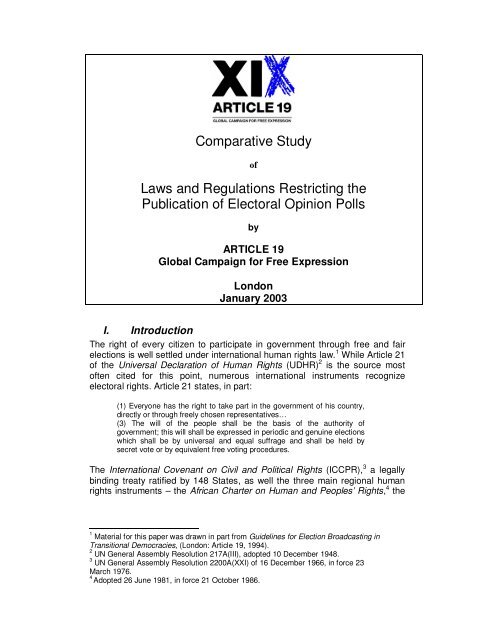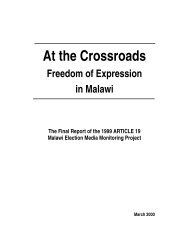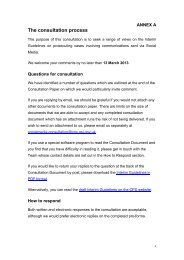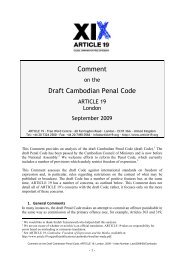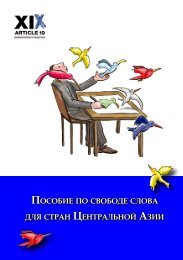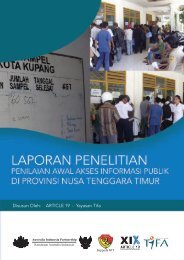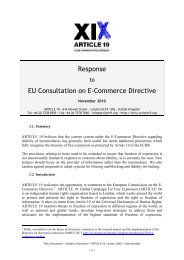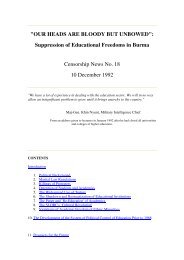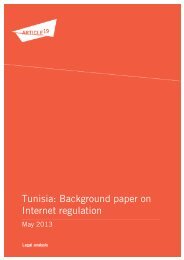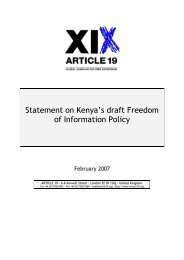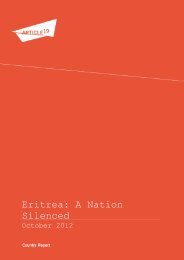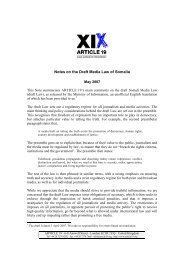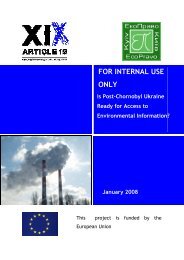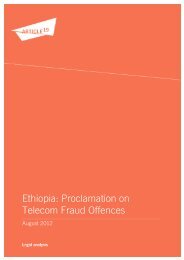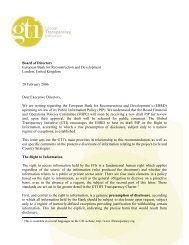Comparative Study Laws and Regulations Restricting the ... - Article 19
Comparative Study Laws and Regulations Restricting the ... - Article 19
Comparative Study Laws and Regulations Restricting the ... - Article 19
You also want an ePaper? Increase the reach of your titles
YUMPU automatically turns print PDFs into web optimized ePapers that Google loves.
<strong>Comparative</strong> <strong>Study</strong>of<strong>Laws</strong> <strong>and</strong> <strong>Regulations</strong> <strong>Restricting</strong> <strong>the</strong>Publication of Electoral Opinion PollsbyARTICLE <strong>19</strong>Global Campaign for Free ExpressionLondonJanuary 2003I. IntroductionThe right of every citizen to participate in government through free <strong>and</strong> fairelections is well settled under international human rights law. 1 While <strong>Article</strong> 21of <strong>the</strong> Universal Declaration of Human Rights (UDHR) 2 is <strong>the</strong> source mostoften cited for this point, numerous international instruments recognizeelectoral rights. <strong>Article</strong> 21 states, in part:(1) Everyone has <strong>the</strong> right to take part in <strong>the</strong> government of his country,directly or through freely chosen representatives…(3) The will of <strong>the</strong> people shall be <strong>the</strong> basis of <strong>the</strong> authority ofgovernment; this will shall be expressed in periodic <strong>and</strong> genuine electionswhich shall be by universal <strong>and</strong> equal suffrage <strong>and</strong> shall be held bysecret vote or by equivalent free voting procedures.The International Covenant on Civil <strong>and</strong> Political Rights (ICCPR), 3 a legallybinding treaty ratified by 148 States, as well <strong>the</strong> three main regional humanrights instruments – <strong>the</strong> African Charter on Human <strong>and</strong> Peoples’ Rights, 4 <strong>the</strong>1 Material for this paper was drawn in part from Guidelines for Election Broadcasting inTransitional Democracies, (London: <strong>Article</strong> <strong>19</strong>, <strong>19</strong>94).2 UN General Assembly Resolution 217A(III), adopted 10 December <strong>19</strong>48.3 UN General Assembly Resolution 2200A(XXI) of 16 December <strong>19</strong>66, in force 23March <strong>19</strong>76.4Adopted 26 June <strong>19</strong>81, in force 21 October <strong>19</strong>86.
American Convention on Human Rights, 5 <strong>and</strong> <strong>the</strong> European Convention for<strong>the</strong> Protection of Human Rights <strong>and</strong> Fundamental Freedoms (ECHR) 6 – allguarantee electoral rights.These same instruments also guarantee <strong>the</strong> right to freedom of expression<strong>and</strong> <strong>the</strong> right of <strong>the</strong> public to receive information <strong>and</strong> ideas, as well as <strong>the</strong> rightof <strong>the</strong> mass media to impart information <strong>and</strong> ideas. <strong>Article</strong> <strong>19</strong> of <strong>the</strong> ICCPR,for example, guarantees freedom of expression in <strong>the</strong> following terms:1. Everyone shall have <strong>the</strong> right to hold opinions without interference.2. Everyone shall have <strong>the</strong> right to freedom of expression; this right shallinclude freedom to seek, receive <strong>and</strong> impart information <strong>and</strong> ideas of allkinds, regardless of frontiers, ei<strong>the</strong>r orally, in writing or in print, in <strong>the</strong> formof art, or through any o<strong>the</strong>r media of his choice.It is uncontroversial to state that democracy depends on all contesting pointsof view being fairly <strong>and</strong> equitably communicated so that <strong>the</strong> people may makeinformed choices. As noted by <strong>the</strong> European Court of Human Rights in <strong>the</strong>case of Bowman v. United Kingdom, <strong>the</strong> right to free elections (<strong>Article</strong> 3 of <strong>the</strong>ECHR) <strong>and</strong> freedom of expression (<strong>Article</strong> 10 of <strong>the</strong> ECHR) operate toreinforce each o<strong>the</strong>r <strong>and</strong> “toge<strong>the</strong>r form <strong>the</strong> bedrock of any democraticsystem.” 7 Freedom of expression, <strong>the</strong> Court continued:is one of <strong>the</strong> “conditions” necessary to “ensure <strong>the</strong> free expression of <strong>the</strong> opinionof <strong>the</strong> people in <strong>the</strong> choice of <strong>the</strong> legislature. For this reason, it is particularlyimportant in <strong>the</strong> period preceding an election that opinions <strong>and</strong> information of allkinds are permitted to circulate freely.Similar statements have been made by courts all over <strong>the</strong> world.Never<strong>the</strong>less, <strong>the</strong>re are circumstances in which <strong>the</strong> two rights may come intoconflict <strong>and</strong> international law recognises that certain restrictions on freedom ofexpression in order to ensure that <strong>the</strong> political debate prior to an election isnot distorted may be legitimate. Most countries have imposed somerestrictions of this sort. For example, controls on election spending are verycommon, <strong>and</strong> <strong>the</strong>se obviously affect freedom of expression.One specific area in which restrictions on freedom of expression have beenimposed to protect <strong>the</strong> integrity <strong>and</strong> fairness of <strong>the</strong> electoral process is inrelation to <strong>the</strong> publication of pre-election opinion <strong>and</strong> exit polls. Pre-electionpolls are public surveys which assess <strong>the</strong> views of <strong>the</strong> electorate on variouselection-related matters while exit polls take place immediately after peoplehave voted <strong>and</strong> assess <strong>the</strong> level of support for <strong>the</strong> various parties <strong>and</strong>c<strong>and</strong>idates. Media coverage of such information can, at times, becontroversial. This is particularly true of polls <strong>and</strong> projections commissioned orconducted by a source that is not impartial. Fur<strong>the</strong>rmore, polls may be subjectto manipulation at many levels: in <strong>the</strong> choice of questions, <strong>the</strong> choice of5 Adopted 22 November <strong>19</strong>69, O.A.S. Treaty Series No. 36, 1144 U.N.T.S. 123, in force 18July <strong>19</strong>78.6Adopted 4 November <strong>19</strong>50, in force 3 September <strong>19</strong>53.7 <strong>19</strong> February <strong>19</strong>98, Application No.24839/94.2
sample, <strong>the</strong> time that <strong>the</strong> questions are asked, <strong>and</strong> so on. 8 It is oftenperceived, <strong>the</strong>refore, that polls <strong>and</strong> projections may have a distorting effect on<strong>the</strong> vote, ra<strong>the</strong>r than simply reflecting public sentiments.Consequently, many governments have adopted laws or regulations thatrestrict <strong>the</strong> reporting of electoral opinion polls by <strong>the</strong> media (discussed ingreater detail in <strong>the</strong> next Part). Such laws <strong>and</strong> regulations constitute a defacto restriction on <strong>the</strong> freedom of expression as <strong>the</strong>y interfere with both <strong>the</strong>principle of editorial independence <strong>and</strong> <strong>the</strong> public’s right to receiveinformation.It is well recognized under international law that any limitation placed onfreedom of expression must remain within strictly defined parameters. Theuniversally accepted st<strong>and</strong>ard for restrictions is set by <strong>Article</strong> <strong>19</strong>(3) of <strong>the</strong>ICCPR, which states:The exercise of <strong>the</strong> [right to freedom of expression] carries with it specialduties <strong>and</strong> responsibilities. It may <strong>the</strong>refore be subject to certainrestrictions, but <strong>the</strong>se shall only be such as are provided by Act <strong>and</strong> arenecessary:(a) For respect of <strong>the</strong> rights or reputations of o<strong>the</strong>rs;(b) For <strong>the</strong> protection of national security or of public order (ordrepublic), or of public health or morals.This article subjects any restriction on <strong>the</strong> right to freedom of expression to astrict three-part test, requiring that any restriction must a) be provided by Act; b)be for <strong>the</strong> purpose of safeguarding a legitimate public interest; <strong>and</strong> c) benecessary to secure this interest. 9The third part of this test means that even measures which seek to protect alegitimate interest must meet <strong>the</strong> requisite st<strong>and</strong>ard established by <strong>the</strong> term“necessity”. Although absolute necessity is not required, a “pressing social need”must be demonstrated, <strong>the</strong> restriction must be proportionate to <strong>the</strong> legitimateaim pursued <strong>and</strong> <strong>the</strong> reasons given to justify <strong>the</strong> restriction must be relevant <strong>and</strong>sufficient. 10 As has been noted:‘[The adjective ‘necessary’] is not synonymous with “indispensable”,nei<strong>the</strong>r has it <strong>the</strong> flexibility of such expressions as “admissible”,“ordinary”, “useful”, “reasonable” or “desirable”. [It] implies <strong>the</strong> existenceof a “pressing social need”. 118 See www.aceproject.org for <strong>the</strong> results of an international study on electoral opinion polls<strong>and</strong> <strong>the</strong>ir coverage in <strong>the</strong> media.9 For an elaboration of this test see Goodwin v. United Kingdom, 27 March <strong>19</strong>96, ApplicationNo. 17488/90, 22 EHRR 123 (European Court of Human Rights), paras. 28-37.10 Sunday Times v. United Kingdom, 26 April <strong>19</strong>79, Application No. 6538/74, 2 EHRR 245(European Court of Human Rights), para. 62. These st<strong>and</strong>ards have been reiterated in a largenumber of cases.11 Sunday Times v. <strong>the</strong> United Kingdom, 26 April <strong>19</strong>79, Application No. 6538/74, para. 59(European Court of Human Rights). See also <strong>the</strong> UN Human Rights Committee case, Mukongv. Cameroon, Communication No. 458/<strong>19</strong>91, 21 July <strong>19</strong>94, 49 GAOR Supp. No. 40, UN Doc.A/49/40, para. 9.7.3
In general, <strong>the</strong>re are two ways in which any risk of distortion from pre-electionpolls can be minimised <strong>and</strong> both means have been employed in countriesaround <strong>the</strong> world. First, many countries prohibit <strong>the</strong> publication of such polls in<strong>the</strong> period immediately preceding <strong>the</strong> vote. A controversial issue here is <strong>the</strong>timeframe over which such a prohibition applies <strong>and</strong> whe<strong>the</strong>r this can bejustified as a restriction on freedom of expression. In practice, <strong>the</strong> length ofsuch prohibitions range from Singapore, a country not known for respectingfreedom of expression, where polls are prohibited for <strong>the</strong> whole of <strong>the</strong> electionperiod, to countries such as Australia, South Africa <strong>and</strong> <strong>the</strong> United States,which do not impose such restrictions.In some countries, such as Canada <strong>and</strong> France, constitutional decisions havehelped to clarify <strong>the</strong> legitimacy of such prohibitions <strong>and</strong>, in particular, <strong>the</strong>timeframe over which a prohibition may be legitimate. In both of <strong>the</strong>se cases,<strong>the</strong> prohibitions were shortened, respectively, to polling day <strong>and</strong> to 24 hoursbefore <strong>the</strong> vote, following challenges to longer prohibitions based on <strong>the</strong>guarantee of freedom of expression.Second, some countries require <strong>the</strong> publication or broadcasting of polls, bothpre-election <strong>and</strong> exit, to be accompanied by certain information, such as <strong>the</strong>source of <strong>the</strong> poll, <strong>the</strong> margin of error, <strong>the</strong> date on which <strong>the</strong> poll wasconducted <strong>and</strong> so on. This can help serve as a sort of ‘health warning’ about<strong>the</strong> validity of <strong>the</strong> poll <strong>and</strong> help avoid situations where electors place unduereliance on <strong>the</strong> poll.II. Country ProfilesWhat follows is a brief overview of <strong>the</strong> relevant legislation in 16 countries, aswell as st<strong>and</strong>ards set out by <strong>the</strong> Council of Europe <strong>and</strong> ARTICLE <strong>19</strong>,regarding <strong>the</strong> publication of election survey results. We have not providedcommentary on <strong>the</strong> different approaches taken by different countries <strong>and</strong>while some governments have intentionally sought to make <strong>the</strong>ir lawsconsistent with human rights st<strong>and</strong>ards, o<strong>the</strong>rs have not <strong>and</strong> some of <strong>the</strong>systems outlined below are clearly in breach of <strong>the</strong> right to freedom ofexpression.Albania<strong>Article</strong> 130 of <strong>the</strong> Electoral Code of <strong>the</strong> Republic of Albania, 2000, whichgoverns <strong>the</strong> election of National Assembly members <strong>and</strong> <strong>the</strong> conduct of localgovernment referendums, prohibits <strong>the</strong> publication of opinion poll resultsduring <strong>the</strong> last five days of <strong>the</strong> election campaign. Exit polls are notspecifically addressed. Poll results published before <strong>the</strong> proscribed periodcommences must include <strong>the</strong> names of both <strong>the</strong> pollster <strong>and</strong> survey sponsor,<strong>the</strong> sample size, <strong>the</strong> margin of error, <strong>and</strong> <strong>the</strong> time period during which <strong>the</strong> pollwas taken. The penalty for violating <strong>the</strong>se provisions is a fine of 100,000 -500,000 lek (approx. US$760 - $3,800) for members of <strong>the</strong> media, <strong>and</strong>between 1,000 - 2,500 lek for everyone else. 1212 The full text of <strong>the</strong> legislation is available at: http://www2.essex.ac.uk/elect/legi_index.htm.4
AustraliaAustralia has no legal restrictions on <strong>the</strong> publication of ei<strong>the</strong>r pre-electionopinion polls or – with <strong>the</strong> exception of <strong>the</strong> state of Victoria – exit polls.Reportedly, <strong>the</strong> Australian media rarely use exit polls due to negative pastexperiences with erroneous results <strong>and</strong> <strong>the</strong> increased speed at which officialelection results are delivered. 13BulgariaBulgarian law prohibits <strong>the</strong> publication of new electoral survey results at anypoint during <strong>the</strong> last 14 days of <strong>the</strong> election campaign, <strong>and</strong> also on electionday. The penalty for violation is a fine of 50 - 5,000 leva (approximatelyUS$28 - $2,750). 14CanadaThe reporting of poll results during federal elections is regulated by <strong>the</strong>Canada Elections Act, 2000. The Act prohibits <strong>the</strong> transmission of newelection survey results to <strong>the</strong> public on polling day, before <strong>the</strong> close of all <strong>the</strong>polling stations in <strong>the</strong> electoral district. Exit polls may not be shown until <strong>the</strong>close of polls <strong>and</strong> transmission of election results from a district one time zoneto those in ano<strong>the</strong>r are not permitted before <strong>the</strong> close of polls in <strong>the</strong> districtwhere <strong>the</strong> polls close later, to take account of <strong>the</strong> numerous time zones inCanada. 15The Act also stipulates that <strong>the</strong> first person to transmit <strong>the</strong> results of anelection survey to <strong>the</strong> public, or any person who transmits <strong>the</strong> results within 24hours after <strong>the</strong>y are first transmitted, must provide <strong>the</strong> following additionalinformation:• <strong>the</strong> name of <strong>the</strong> sponsor of <strong>the</strong> survey;• <strong>the</strong> name of <strong>the</strong> person or organization that conducted <strong>the</strong> survey;• <strong>the</strong> date on which or <strong>the</strong> period during which <strong>the</strong> survey wasconducted;• <strong>the</strong> population from which <strong>the</strong> sample of respondents was drawn;• <strong>the</strong> number of people who were contacted to participate in <strong>the</strong> survey ;<strong>and</strong>• if applicable, <strong>the</strong> margin of error in respect of <strong>the</strong> data obtained. 16These rules are new, <strong>and</strong> result from a Supreme Court decision holding that a72-hour ban on <strong>the</strong> publication of opinion survey results prior to electionsviolated freedom of expression as protected by <strong>the</strong> Canadian Charter ofRights <strong>and</strong> Freedoms, <strong>and</strong> could not be justified as necessary to protect <strong>the</strong>13 T. Bale, “<strong>Restricting</strong> <strong>the</strong> Broadcast <strong>and</strong> Publication of Pre-Election <strong>and</strong> Exit Polls: SomeSelected Examples”, in Representation (2002), Vol. 39, No.1, p. 16.14 <strong>Article</strong> 60 of <strong>the</strong> Election of Members of <strong>the</strong> National Assembly, Municipal Councillors <strong>and</strong>Mayors Act, <strong>19</strong>91. Full text of <strong>the</strong> legislation is available at:http://www2.essex.ac.uk/elect/legi_index.htm.15 Sections 328 <strong>and</strong> 329 of <strong>the</strong> Canada Elections Act.16 Full text of <strong>the</strong> legislation is available at: http://laws.justice.gc.ca/en/E-2.01/13937.html#rid-14037.5
integrity of <strong>the</strong> electoral process. 17 The Court applied a necessity test verysimilar to <strong>the</strong> three-part test contained in <strong>the</strong> ICCPR.The Canadian government argued that <strong>the</strong> three-day ban was required toprotect against <strong>the</strong> threat to freedom of choice by inaccurate polls <strong>and</strong> toprotect some voters from being excessively influenced by polls. The SupremeCourt stated that <strong>the</strong> government “cannot take <strong>the</strong> most uninformed <strong>and</strong> naïvevoter as <strong>the</strong> st<strong>and</strong>ard by which constitutionality is assessed.” Ra<strong>the</strong>r, <strong>the</strong> bansends <strong>the</strong> message to voters that <strong>the</strong> media can be constrained bygovernment not to publish factual information. The Supreme Court was of <strong>the</strong>view that <strong>the</strong> tangible harms to freedom of expression caused by <strong>the</strong> banwere not outweighed by <strong>the</strong> intangible benefits, <strong>and</strong> that less restrictivemeasures are available to protect <strong>the</strong> population from inaccurate polls,including requiring that <strong>the</strong> media publish information on <strong>the</strong> survey’smethodology.Notably, <strong>the</strong> Supreme Court alluded to circumstances, for example, in <strong>the</strong>context of unfettered paid political advertising, in which <strong>the</strong> nature of <strong>the</strong>interests of <strong>the</strong> speakers could make <strong>the</strong> expression “inimical to <strong>the</strong> exerciseof free <strong>and</strong> informed choice by o<strong>the</strong>rs.” However, <strong>the</strong> court concluded that nosuch systemic or structural dangers currently exist in Canada. This might,however, be <strong>the</strong> case, for example in a country where major media outletswere controlled by vested political interests.Czech RepublicThe publication of opinion polls is prohibited in <strong>the</strong> Czech Republic for <strong>the</strong>entire week preceding <strong>the</strong> day of elections, up until <strong>the</strong> close of voting.Additionally, no exit polls may be undertaken on election day in <strong>the</strong> building inwhich a polling station has been located. 18 Presumably exit polls may beconducted elsewhere.FranceUnder <strong>Article</strong> 11 of <strong>the</strong> Loi 77-808 du <strong>19</strong> Juillet <strong>19</strong>77, <strong>the</strong> publication <strong>and</strong>broadcasting of opinion polls was banned for <strong>the</strong> seven days preceding eachof <strong>the</strong> two rounds of voting in <strong>the</strong> country’s national elections. Exit polls werebanned until <strong>the</strong> close of voting.In <strong>19</strong>97, however, several newspapers ei<strong>the</strong>r published opinion poll resultswithin <strong>the</strong> blackout period or indicated to readers where such results could befound on <strong>the</strong> Internet, in violation of <strong>the</strong> <strong>19</strong>77 law. The newspapers wereprosecuted by <strong>the</strong> Commission des Sondages – <strong>the</strong> regulatory body chargedwith overseeing <strong>the</strong> law – <strong>and</strong> <strong>the</strong> case went to <strong>the</strong> country’s highest judicialcourt, <strong>the</strong> Cour de cassation. In a l<strong>and</strong>mark decision, <strong>the</strong> French court heldthat <strong>the</strong> <strong>19</strong>77 law violated <strong>Article</strong> 10 of <strong>the</strong> European Convention on Human17 Thomson Newspapers Co. v. Canada (Attorney General), [<strong>19</strong>98] 1 S.C.R. 877(“Thomson”). Available at: http://www.lexum.umontreal.ca/cscscc/en/pub/<strong>19</strong>98/vol1/html/<strong>19</strong>98scr1_0877.html.18 <strong>Article</strong> 16 of <strong>the</strong> law on Elections to <strong>the</strong> Parliament of <strong>the</strong> Czech Republic, <strong>and</strong> onAmendments of Certain O<strong>the</strong>r Acts, <strong>19</strong>95. Full text of <strong>the</strong> legislation is available at:http://www2.essex.ac.uk/elect/legi_index.htm.6
Rights, protecting freedom of expression, <strong>and</strong> specifically <strong>the</strong> electorate’s rightto receive <strong>and</strong> communicate information.Following <strong>the</strong> Court’s decision <strong>the</strong> French Senate conducted its own study of<strong>the</strong> law <strong>and</strong> concluded that <strong>the</strong> week-long ban violated freedom of information(in addition to <strong>the</strong> media’s right to expression) because it permitted <strong>the</strong> mediato rely on poll results to inform <strong>the</strong>ir reporting, but to keep <strong>the</strong> basis of thatreporting – <strong>the</strong> poll results – secret from <strong>the</strong> public. The Senate alsoconcluded that modern communication technologies undermine <strong>the</strong> viability ofmedia blackouts, as information may be published in o<strong>the</strong>r countries,accessible to audiences via satellite or <strong>the</strong> Internet.A new law, adopted in February 2002, replaces <strong>the</strong> week-long prohibition witha 24-hour publication ban. With <strong>the</strong> exception of Internet sites, no person maypublish or o<strong>the</strong>rwise transmit <strong>the</strong> results of any opinion poll – whenevercarried out – on <strong>the</strong> day before <strong>the</strong> vote. When opinion poll results arepublished, <strong>the</strong> law imposes an obligation on <strong>the</strong> media to provide details of<strong>the</strong> poll’s methodology (this is unchanged from <strong>the</strong> <strong>19</strong>77 law), <strong>and</strong> exit pollsremain prohibited. <strong>19</strong>IndiaIn <strong>19</strong>98, <strong>the</strong> Election Commission of India issued its Guidelines for <strong>the</strong>Publication <strong>and</strong> Dissemination of Results of Opinion Polls/Exit Polls,prohibiting <strong>the</strong> publication of opinion poll results beginning 48 hours before <strong>the</strong>start of voting, <strong>and</strong> continuing until <strong>the</strong> polls closed. Organisations or agenciesthat conducted <strong>and</strong> published <strong>the</strong> results of an opinion poll before <strong>the</strong> blackoutwere required by <strong>the</strong> Guidelines to indicate <strong>the</strong> survey’s sample size, <strong>the</strong>geographic spread of <strong>the</strong> survey, <strong>the</strong> margin of error, details regarding <strong>the</strong>methodology, <strong>and</strong> information about <strong>the</strong> organization.During <strong>the</strong> <strong>19</strong>99 election, numerous media institutions ignored <strong>the</strong> ban <strong>and</strong>were subsequently prosecuted by <strong>the</strong> Election Commission. After a number oflower court decisions, <strong>the</strong> Supreme Court of India ruled that <strong>the</strong> CommissionGuidelines “exceeded <strong>the</strong> power of ‘superintendence, direction <strong>and</strong> control’granted to it by <strong>Article</strong> 324 of <strong>the</strong> [Indian] Constitution.” 20 The Court alsoquestioned <strong>the</strong> practicality of such a ban, given <strong>the</strong> presence of international<strong>and</strong> online media in <strong>the</strong> country. The Commission Guidelines have since beenwithdrawn, <strong>and</strong> no new legislation has been enacted. Renewed calls for someform of ban on <strong>the</strong> publication of opinion <strong>and</strong> exit poll results were heard lastFebruary after numerous exit polls were wrong, prompting accusations ofmedia bias. 21ItalyUnder Law No. 28/2000, a prohibition on <strong>the</strong> publication of electoral pollsbegins 15 days before election day <strong>and</strong> continues until <strong>the</strong> close of voting.<strong>19</strong> For a discussion of <strong>the</strong> new law <strong>and</strong> its full text, in French, see: www.senat.fr/leg/pp100-057.html.20 Note 13, pp. 18-<strong>19</strong>.21 The Tribune (India), 17 February 2002. Online:http://www.tribuneindia.com/2002/20020217/punjab1.htm.7
Results that are published prior to <strong>the</strong> blackout period must be accompaniedby information about <strong>the</strong> polling methodology, sample size, date, <strong>and</strong>response rate. The same data must also be submitted to <strong>the</strong> Department ofInformation <strong>and</strong> Press, which will post <strong>the</strong> information on a dedicated website.Although Italy’s regime is one of <strong>the</strong> most restrictive in Europe, previouslegislation imposed an even longer prohibition period. 22MontenegroThe Law on Election of Municipal Councilmen <strong>and</strong> National AssemblyRepresentatives, <strong>19</strong>98, prohibits <strong>the</strong> publicly owned media from publicizingelectoral survey results <strong>the</strong> entire week prior to election day. The publiclyowned media are also prohibited from carrying exit polls. 23Peru<strong>Article</strong> <strong>19</strong>1 of <strong>the</strong> Lei Organica de Elecciones, <strong>19</strong>97, (Electoral Law) imposesa 15-day blackout period on <strong>the</strong> publication of electoral survey results prior toelection day. The sanction for violation is a fine, <strong>the</strong> amount of which isdetermined by <strong>the</strong> National Legal Election Oversight Commission.Russia<strong>Article</strong> 47 of <strong>the</strong> Law on Elections for <strong>the</strong> Russian President, 2002, prohibits<strong>the</strong> publication of any electoral survey results for five days prior to electionday <strong>and</strong> on election day itself. The law fur<strong>the</strong>r requires that when opinionpolls are published, <strong>the</strong> following information must be provided: <strong>the</strong> name of<strong>the</strong> organization publishing <strong>the</strong> survey results, <strong>the</strong> name of <strong>the</strong> organizationthat conducted <strong>the</strong> survey, <strong>the</strong> name of <strong>the</strong> organization that commissioned<strong>the</strong> survey, <strong>the</strong> time frame in which <strong>the</strong> survey was conducted, <strong>the</strong> samplesize, <strong>the</strong> geographic region in which <strong>the</strong> survey was conducted, <strong>the</strong> exactwording of <strong>the</strong> question, <strong>the</strong> method of collecting <strong>the</strong> information, <strong>and</strong> <strong>the</strong>margin of error. 24SingaporeThe Parliamentary Elections Act, 2001, severely restricts <strong>the</strong> publication ofelectoral opinion poll results <strong>and</strong> imposes an outright prohibition on <strong>the</strong>publication of exit polls. The blackout period for <strong>the</strong> publication of opinion pollresults begins with <strong>the</strong> issuance of <strong>the</strong> “writ of election”, at <strong>the</strong> very beginningof <strong>the</strong> election campaign, <strong>and</strong> ends with <strong>the</strong> close of all polling stations onpolling day. Thus <strong>the</strong> publication of poll results are effectively prohibited for<strong>the</strong> duration of <strong>the</strong> entire election period.The sanction for violation of <strong>the</strong> provisions is a fine not exceeding $1,000(approximately US$580) <strong>and</strong>/or imprisonment for a maximum of 12 months. 2522 Note 13, p. <strong>19</strong>.23 <strong>Article</strong> 63. Full text of <strong>the</strong> legislation is available at:http://www2.essex.ac.uk/elect/legi_index.htm.24 This information is based on an English translation of a nearly final draft of <strong>the</strong> Russian law,provided to ARTICLE <strong>19</strong> by <strong>the</strong> OSCE. The <strong>19</strong>99 Federal Law on <strong>the</strong> Election of Deputies of<strong>the</strong> State Duma of <strong>the</strong> Federal Assembly of <strong>the</strong> Russian Federation has been recentlyamended, but ARTICLE <strong>19</strong> was unable to locate an English translation.25 Full text of <strong>the</strong> legislation is available at: http://agcvldb4.agc.gov.sg/non_version/cgibin/cgi_retrieve.pl?&actno=Reved-218&date=latest&method=part.8
South AfricaThere is no prohibition on <strong>the</strong> publication of electoral survey results prior to anelection. Exit polls, however, are banned by <strong>the</strong> <strong>19</strong>98 Electoral Act, whichstates at section 109: “During <strong>the</strong> prescribed hours for an election, no personmay print, publish or distribute <strong>the</strong> result of any exit poll taken in thatelection.” 26Compliance with <strong>the</strong> Electoral Act is monitored <strong>and</strong> enforced by <strong>the</strong>independent Electoral Commission, which has <strong>the</strong> power to bring proceedingsfor non-compliance before a specially-created Electoral Court.SwedenIn Sweden, as with <strong>the</strong> o<strong>the</strong>r Sc<strong>and</strong>inavian countries, <strong>the</strong>re are no formallegal restrictions against <strong>the</strong> publication of electoral survey results during anelection campaign. In practice, however, no media organisation publishes pollresults later than a day before <strong>the</strong> election, <strong>and</strong> exit poll results are notpublished until all polling stations have closed. 27United KingdomThere are currently no restrictions on <strong>the</strong> publication of pre-election surveys,although <strong>the</strong> publication of exit polls taken before voting closes is prohibitedby <strong>the</strong> Representation of <strong>the</strong> People Act, 2000.The sanction for contravention of <strong>the</strong> exit poll publication ban is <strong>the</strong> same asfor o<strong>the</strong>r summary conviction offences: a fine or imprisonment of no morethan six months.The absence of legislative prohibition has been explained by <strong>the</strong> Britishmedia’s commitment to self-regulation <strong>and</strong> impartiality. 28 The BritishBroadcasting Corporation (BBC), for example, has internal guidelines onreporting opinion polls that have reportedly been effective for a number ofyears, following a fiasco during <strong>the</strong> <strong>19</strong>92 elections in which almost all <strong>the</strong>reported polls were proven wrong. 29 A sample of <strong>the</strong> BBC’s self-imposedreporting guidelines include:• not leading a programme or bulletin with <strong>the</strong> results of a pre-electionpoll;• not including <strong>the</strong> results of an election survey in a headline;• not relying on <strong>the</strong> interpretation given to a poll’s result by <strong>the</strong>publication or organization which commissioned it;• always reporting <strong>the</strong> expected margin of error, <strong>and</strong> where <strong>the</strong> gapbetween <strong>the</strong> two leading contenders is within <strong>the</strong> combined margin oferror, saying so; <strong>and</strong>26 Full text of <strong>the</strong> South African legislation is available at:http://www.polity.org.za/html/govdocs/legislation/<strong>19</strong>98/act73.pdf.27 Note 13, p. <strong>19</strong>.28 Ibid., p. 20.29 See: http://www.aceproject.org/main/english/me/mec03c.htm.9
• always reporting <strong>the</strong> dates of <strong>the</strong> poll, <strong>and</strong> who commissioned <strong>and</strong>carried out <strong>the</strong> poll. 30United StatesIn spite of messy Presidential elections in 2000, which included sharp public<strong>and</strong> official criticism of <strong>the</strong> media for <strong>the</strong> widespread reporting of an inaccurateexit poll, <strong>the</strong>re are currently no legal restrictions on ei<strong>the</strong>r <strong>the</strong> publication ofpre-election opinion polls or exit polls. It may be assumed that a ban of thisnature would be unlikely to withst<strong>and</strong> a constitutional challenge in <strong>the</strong> UnitedStates.Council of EuropeIn September <strong>19</strong>99, <strong>the</strong> Committee of Ministers of <strong>the</strong> Council of Europeadopted Recommendation No. R (99) 15 On Measures Concerning MediaCoverage of Election Campaigns. While stressing <strong>the</strong> importance <strong>and</strong>fundamental nature of <strong>the</strong> principle of <strong>the</strong> editorial independence of <strong>the</strong> media,<strong>the</strong> Ministers noted that, “particular attention should be paid to specificfeatures of <strong>the</strong> coverage of election campaigns, such as <strong>the</strong> dissemination ofopinion polls, paid political advertising, <strong>the</strong> right of reply, days of reflection <strong>and</strong>provision for pre-electoral time.” The Ministers recommended that memberState governments examine ways of ensuring respect for <strong>the</strong> principles offairness, balance <strong>and</strong> impartiality in <strong>the</strong> coverage of election campaigns by<strong>the</strong> media.In that regard, <strong>the</strong> Recommendation makes <strong>the</strong> following statement regardingopinion polls:Regulatory or self-regulatory frameworks should ensure that <strong>the</strong> media, whendisseminating results of opinion polls, provide <strong>the</strong> public with sufficientinformation to make a judgment on <strong>the</strong> value of <strong>the</strong> polls. Such informationcould, in particular:- name <strong>the</strong> political party or o<strong>the</strong>r organisation or person whichcommissioned <strong>and</strong> paid for <strong>the</strong> poll;- identify <strong>the</strong> organisation conducting <strong>the</strong> poll <strong>and</strong> <strong>the</strong> methodologyemployed;- indicate <strong>the</strong> sample <strong>and</strong> margin of error of <strong>the</strong> poll;- indicate <strong>the</strong> date <strong>and</strong>/or period when <strong>the</strong> poll was conducted.All o<strong>the</strong>r matters concerning <strong>the</strong> way in which <strong>the</strong> media present <strong>the</strong> results ofopinion polls should be decided by <strong>the</strong> media <strong>the</strong>mselves. Any restriction onmember States forbidding <strong>the</strong> publication/broadcasting of opinion polls (onvoting intentions) on voting day or a number of days before <strong>the</strong> election shouldcomply with <strong>Article</strong> 10 of <strong>the</strong> European Convention on Human Rights [freedom ofexpression], as interpreted by <strong>the</strong> European Court of Human Rights.Similarly, in respect of exit polls, member States may consider prohibitingreporting by <strong>the</strong> media on results of such polls until all polling stations in <strong>the</strong>country have closed.ARTICLE <strong>19</strong>In <strong>19</strong>94, ARTICLE <strong>19</strong> published Guidelines for Election Broadcasting inTransitional Democracies, an analysis of a wide range of issues relating tobroadcasting in relation to elections, along with guidelines for broadcasters30 The BBC Guidelines are available online at:http://www.bbc.co.uk/info/genelection/section4.shtml#polls.10
<strong>and</strong> decision-makers on <strong>the</strong>se issues. Although <strong>the</strong>se guidelines are directedspecifically at broadcasters, <strong>the</strong>y are of some relevance here. The relevantguideline on opinion polls states:Guideline 12:Opinion Polls <strong>and</strong> Election ProjectionsGUIDELINE Guideline 12.1If A broadcaster a which publishes <strong>the</strong> <strong>the</strong> results of an opinion poll poll should or election identifyprojection, <strong>the</strong> organization it should that strive conducted to report <strong>the</strong> <strong>the</strong> poll, results <strong>the</strong> organization fairly <strong>and</strong>, in or particular, party that topublish commissioned all readily <strong>and</strong> available paid for information <strong>the</strong> poll, <strong>the</strong> that methodology would assist <strong>the</strong> employed, listeners <strong>the</strong> inunderst<strong>and</strong>ing sample size, <strong>the</strong> margin poll's significance. of error, <strong>and</strong> <strong>the</strong> fieldwork dates. In addition, <strong>the</strong>broadcaster should state that <strong>the</strong> poll reflects public opinion only at <strong>the</strong> timethat <strong>the</strong> poll was taken.11
III. ConclusionThis survey of <strong>the</strong> regulatory approaches adopted by various democraticgovernments to <strong>the</strong> publication of pre-election opinion <strong>and</strong> exit polls revealsno set pattern from which general rules can be derived. Of <strong>the</strong> 16 jurisdictionssurveyed, <strong>the</strong> following picture emerges: 6 countries – Australia, India, South Africa, Sweden, <strong>the</strong> UnitedKingdom <strong>and</strong> <strong>the</strong> United States – impose no restrictions; 2 countries – Canada <strong>and</strong> France – impose restrictions of 24 hours orless; 2 countries – Albania <strong>and</strong> Russia – impose restrictions of between 3<strong>and</strong> 5 days; <strong>and</strong> 6 countries – Bulgaria, Czech Republic, Italy, Montenegro, Peru <strong>and</strong>Singapore – impose restrictions of 7 days or more.It is significant that from among <strong>the</strong> established democracies surveyed, onlyItaly imposes a ban of more than 24 hours <strong>and</strong> that <strong>the</strong>re is a clear trendtowards shorter bans. Courts in <strong>the</strong>se countries have questioned <strong>the</strong>assumption implicit in bans that voters are uninformed <strong>and</strong> naïve, as well as<strong>the</strong> implications of bans of this nature – which prevent <strong>the</strong> media fromdisseminating true, factual material – for freedom of expression. These courtshave also noted that in <strong>the</strong> modern world, where access to <strong>the</strong> Internet <strong>and</strong>satellite television is becoming evermore commonplace, bans of this sort mayno longer be viable.Whe<strong>the</strong>r a country’s law satisfies <strong>the</strong> three-part test for restrictions onfreedom of expression does depend to some extent on <strong>the</strong> particularcircumstances of that country. An important factor, in addition to <strong>the</strong> degree ofInternet <strong>and</strong> satellite television access, is <strong>the</strong> degree of independencepossessed by <strong>the</strong> national media <strong>and</strong> <strong>the</strong> willingness of <strong>the</strong>se media to acceptvoluntary restrictions on reporting on polls. Where important parts of <strong>the</strong>national media, including <strong>the</strong> public media, are controlled by political figures,any risk of bias from opinions polls increases.Whe<strong>the</strong>r opinion polls actually make a difference to election results is highlydebated. Most established democracies ei<strong>the</strong>r eschew <strong>the</strong>m altoge<strong>the</strong>r orhave retained restrictions of very short duration, normally 24 hours or less.Where longer restrictions apply, it is up to <strong>the</strong> government to prove that <strong>the</strong>ymeet <strong>the</strong> three-part test for restrictions on freedom of expression. Thisinvolves, first, showing that <strong>the</strong> polls really do undermine <strong>the</strong> right of <strong>the</strong>electoral to freely chose <strong>the</strong>ir elected representatives. Second, a governmentwishing to uphold a ban must show that o<strong>the</strong>r, less intrusive measures, inparticular requiring information about <strong>the</strong> poll, which can serve as a healthwarning, are ineffective in combating <strong>the</strong> distorting influence of polls. In ourview, bans of longer than 24 hours will rarely, outside of specialcircumstances, such as <strong>the</strong> first multi-party election in a country, be able to bejustified.12


